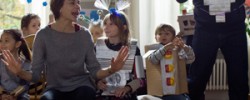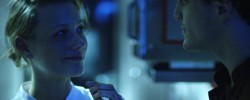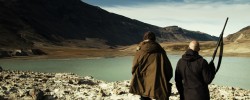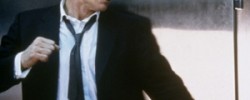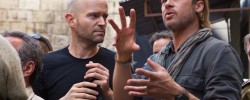
Interview: The Sheepdogs on their documentary, fame, and influences outside of music

Editor’s Notes: The Sheepdogs Have At It opened in Toronto and Saskatoon on June 21st. For more information on the film visit www.thesheepdogs.com and follow the film on Twitter at @TheSheepdogsDoc.
This being my first interview on my own (my last one being Matt Johnson’s The The at the Sheraton Hotel in a room with a dozen other college radio reporters where I got one question in), I had no preconceptions on how it would go. I met the band at the shiny Cambridge Suites in downtown Toronto.
I waited in the lounge area with another group of correspondents as the band walked down from a previous interview over at Citytv. Freshly from watching their documentary The Sheepdogs Have At It, I was wary about what I would ask the group considering they’d been through the ringer with Rolling Stone and many other media outlets trying to figure out how this little band from Saskatoon made it so big so fast.
As their representatives introduce me to Ryan Gullen (bassist) and Sam Corbett (drums/percussion), both of which chose the hotel lounge to sit back with me and have a chat. To get the ball rolling I asked them if they had seen Man Of Steel which has been at the top of my brain since my NP review. They hadn’t seen it, but were very excited about the special effects. I quickly advised them to stay true to that excitement and not to let anyone cloud their viewing it; adding of course, that my review wasn’t a favorable view.
Jacqueline: Did you guys feel a lot of pressure from family and friends after getting the Rolling Stone cover?
Ryan: I think a little bit. The biggest thing is that immediately all that stuff finished we immediately started touring. We didn’t have too much time to fuss and just dive in and do what what we do on stage and make a record. They were things we normally did to keep going to show that we aren’t just a band that won a contest. We’re a real band and that’s integral to maintaining that. I mean there was pressure, but no real time to dedicate to it really.
Sam: Instead of pressure, which to me implies a force pushing on you, it felt we were being pulled in all sort of directions. There were a lot of demands and that’s what it felt like more.

J: Like seeing you on Project Runway! That was hilarious. I imagine that’s part of the pulling process.
Ryan: That was something that we had no choice in the matter. It was tied into winning the contest. It worked out in a good way though since a lot of husbands of wives who watched the show discovered us there. And women who love our kind of music but just happened to be watching the show, they heard us there. In the movie it shows how awkward it was for us.
J: There was this moment when they interviewed your parents and in particular, Sam’s mom was showing the state of her basement. She points to a poster where the head of sheepdog is superimposed on a woman’s body and says, “This is the kind of stuff that ends up in my basement.” How was that for you guys?
Sam: “I’d like to add that I spent three days cleaning up that basement.”
Ryan: “And most of that was Leot’s stuff and did he help?”
Sam: “Nope.” * laughter *
J: Is it weird seeing yourselves on the big screen like that?
Ryan: It is weird, but it’s cool. One part of it is that during that time we were being pulled in all sorts of directions, so we didn’t have a whole lot of time to reflect. The film works as a way for us to reflect and say, “Oh hey I did that and that,” because it was just a big blur during that time. It is weird to see yourself on camera. All lot of time we do interviews, you do it, you’re done with it and you don’t see it afterwards. Then you see it on a big screen with a big group of friends, family or strangers. Last night we were in Saskatoon to our home crowd and that was a little odd.
J: How was the hometown crowd for that?
Sam: They were great. They had a big belly laugh at the Project Runway stuff that’s for sure. And everyone there pretty much loved it. Most of the crowd were people who know us well from way back when. They learned quite a lot from the movie of what our lives were like at that time.
Ryan: They hadn’t seen us in a year after the cover. Some people assumed we were just on cloud nine afterwards and making tons of money. It gives a good insight into how we went about doing things afterwards. It wasn’t about us just being in this competition, but us forming the band in Saskatoon.
J: When does it sink in from being a struggling band, to dreaming and then this is what my life is now? You all worked really hard to get to this point. You do interviews and concerts now. That’s your schedule.
Sam: It does feel more routine now. This is the type of thing that we’ll probably have a better perspective of it ten or twenty years down the road. Sometimes you think about it and say that it was really cool. A lot of the time we’re just so busy that you don’t have much a chance to think about it.
Ryan: As soon as we’re done one thing we’re doing something else. So much of being in this industry is that you don’t really get to reflect on what’s happening to you because you’re constantly thinking of the next thing that’s coming up, or the next thing that needs to get done. We just played a festival this weekend and now we’re going to the UK. We did the festival and it’s done. Now it’s what will it be like when we play Glastonbury? And then even farther ahead and where we want to go. We are constantly looking ahead.
I think what really stuck with us is when we had to quit our day jobs. That’s when it really sunk in. We were a touring a band for five years. We’d tour and then go back to our jobs. I think they knew we were going to quit our day jobs. Us realizing that we could quit those jobs and sustain a relatively comfortable way of living this way was really great.
J: How was it having cameras follow you guys everywhere, especially in the recording studio?
Sam: For this movie it wasn’t as intrusive as for a lot of the Rolling Stone stuff that we had to shoot. A lot of that was staged and we had to do take after take. Having been through that experience this was a lot easier because it was a lot more fly on the wall. And if we needed them to get out of the studio they would oblige.
J: I don’t want to touch upon your influences because many have harped upon your classic rock nostalgia style. I want to ask you, what are you influences outside of music?
Sam: There a book on The Beatles called ‘Revolution In The Head’. That book had as much influence on me in the way I though about music as the music itself. Television show or a great movie can inspire you to create something worthwhile.
Ryan: Our music is also influenced by our travels. The people we meet, our families, and the very interesting characters we’ve met on tour. Playing on Wednesday night in bars at midnight you do run into some odd folks. They do give us ideas. Music is a reflection of where we go as artists.
J: Anything you want to tell the filmgoers who are about to watch the film?
Ryan: Whether you know us or like us or not, the movie gives you a view of who we are beyond the Rolling Stone cover without going too in-depth. It shows us as the hardworking band doing what we do.
Sam: It’s very well made. I think it’s a very accurate portrayal of who we are and what we’re doing.
As I left the hotel lobby, the Ryan and Sam were setting up for the next interview outside since it was such a sunny day. I appreciated the earnestness of those two and hope to see big things for them in the future. If anything it’s a fascinating idea to see this band start off, take off so quickly, and then try to catch up to their successes. Most of all, I wish them some time to reflect because in any industry these days, there needs some time allotted to smelling the roses. I don’t want to see The Sheepdogs burn out.
Related Posts
Jacqueline Valencia
Latest posts by Jacqueline Valencia (see all)
- Review: World War Z (2013) - June 29, 2013
- Interview: The Sheepdogs on their documentary, fame, and influences outside of music - June 24, 2013
- Review: The Sheepdogs Have At It (2012) - June 24, 2013














